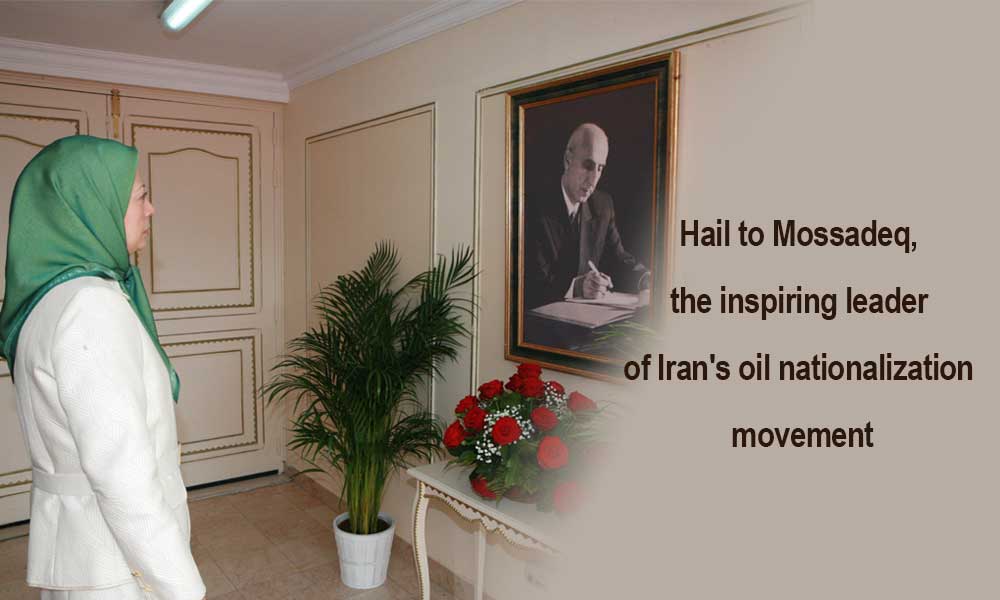Hail to Mossadeq, the inspiring leader of Iran’s oil nationalization movement

As the Iranian Resistance’s Leader Massoud Rajavi has said: “In the context of the struggle and the resistance movement for Iran’s freedom and independence and on the path toward liberation at qualitatively higher stages, not a day goes by without remembering him: Since the day when during the struggle against the monarchic dictatorship and its secret police (SAVAK) and in the regime’s kangaroo courts we took solace in his legacy and exclaimed: We are all children of Mossadeq; to this day, when in the struggle against the Khomeini’s regime that is destroying Iran we continue to draw inspiration from the treasure trove of his experiences, lessons and noble character.”
The great Mossadeq rose up during the Constitutional Revolution (in 1906). He was sent to exile in Europe during the tyranny of Mohammad Ali Shah Qajar.
Mossadeq was the first political personality to oppose the coup d’état (in 1921) by Seyyed Zia-odDin Tabatabaii and Reza Khan. During the fifth Parliament, he opposed Reza Khan’s claim to the throne. He wrote that prior to the convening of the Parliament, Hossein Ala, Mo’taman ol-Molk, Moshiroddoleh, and Mostowfi al-Mamalek wanted to refrain from attending the parliamentary session and were hesitant. Mossadeq recounted: “I told them that gunners are paid ten years worth of salary hoping that they would fire a shell one day. Members of parliament also have a duty to defend the constitution. (Otherwise), … they would be like a Gunner that shirked their responsibilities.”
When they were trying to make Reza Khan a monarch during a phony parliamentary session relying on intimidation and threats, it was Mossadeq’s voice that echoed in the fifth parliamentary session when he said: “Should one person be, at the same time, a king in parliament and a prime minister and a ruler? This would be purely reactionary and complete tyranny. If that is the case, why did you spill the blood of martyrs of freedom in vain? Why did you drive people toward death? You should have said from the beginning that you lied and did not want constitutionalism. You should have said that you did not want freedom. You should have said that you think the people are ignorant and should be punished by force.”
Still, Mossadeq’s name and his historic significance shined during the movement to nationalize Iran’s oil industry. He not only opened a new chapter in our people’s struggle for freedom, but also paved the way for liberation movements in the East.
He blazed the trail through patriotism, commitment and sacrifice. And, he finished it through bravery and being uncompromising over his prinicples. At a time when Iran’s statesmen were completely alienated from the issue of oil and Iran’s interests in this area, Mossadeq assiduously studied the oil dossier and attained a deep level of understanding with respect to the country’s interests in the oil industry. At the same time, his highest expertise was demonstrated in his refusal to compromise and sacrifice his principles on the path to Iran’s liberation from the chains of dependence, reactionary thought and tyranny. It would be right to say that he was the symbol of the Constitutional Revolution. The ideals of the martyrs and heroes of that revolution shined through his historic character.
We believe that the best way to remember and redeem the late leader of Iran’s nationalization movement is to commit to a relentless struggle to overthrow the clerical regime and to institute democracy and freedom in Iran. And, on this path, we once again reiterate our pledge to him and his patriotic objectives as well as his passionate love for Iran’s freedom and independence.
- Tags: Massoud Rajavi

